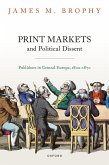Moving book history in a new direction, this study examines publishers as brokers of Central Europe's political public sphere. They created international print markets, translated new texts, launched new journals, supported outspoken authors, and experimented with popular formats. Most of all, they contested censorship with finesse and resolve, thereby undermining the aim of Prussia and Austria to criminalize democratic thought. By packaging dissent through popular media, publishers cultivated broad readerships, promoted political literacy, and refashioned citizenship ideals. As political actors, intellectual midwives, and cultural mediators, publishers speak to a broad range of scholarly interests. Their outsize personalities, their entrepreneurial zeal, and their publishing achievements portray how print markets shaped the political world. The narrow perimeters of political communication in the late-absolutist states of Prussia and Austria curtailed the open market of ideas. The publishing industry contested this information order, working both within and outside legal parameters to create a modern public sphere. Their expansion of print markets, their cat-and-mouse game with censors, and their ingenuity in packaging political commentary sheds light on the production and reception of dissent. Against the backdrop of censorship and police surveillance, the successes and failures of these citizens of print tell us much about nineteenth-century civil society and Central Europe's tortuous pathway to political modernization. Cutting across a range of disciplines, this study will engage social and political historians as well as scholars of publishing, literary criticism, cultural studies, translation, and the public sphere. The history of Central Europe's print markets between Napoleon and the era of unification doubles as a political tale. It sheds important new light on political communication and how publishers exposed German-language readers to the Age of Democratic Revolution.
Dieser Download kann aus rechtlichen Gründen nur mit Rechnungsadresse in A, B, BG, CY, CZ, D, DK, EW, E, FIN, F, GR, HR, H, IRL, I, LT, L, LR, M, NL, PL, P, R, S, SLO, SK ausgeliefert werden.









